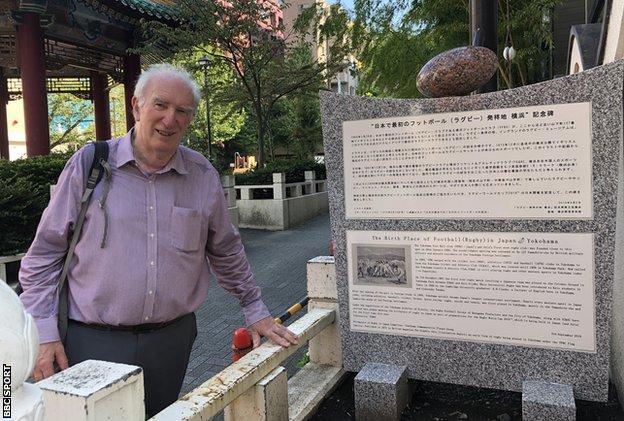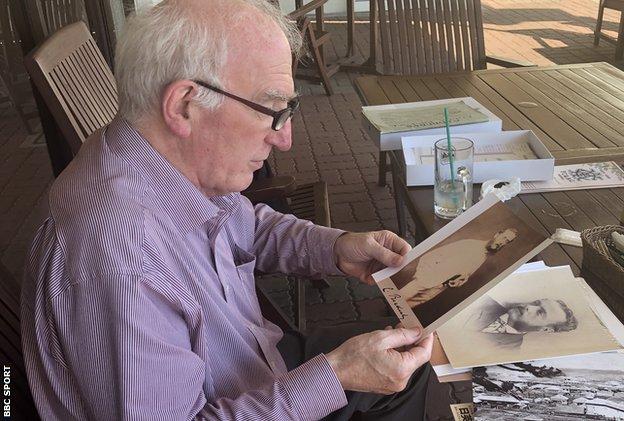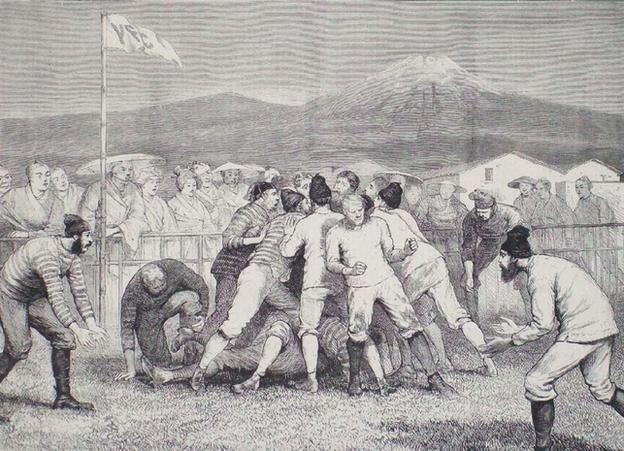Rugby World Cup: One man's search into Japan's mysterious rugby past
Last updated on .From the section Rugby Union


There is a small, white plaque hidden away in the back streets of bustling Yokohama, so hard to find that even the man responsible for its creation has to ask for directions.
That man is Mike Galbraith, a historian who has spent the past decade seeking to uncover the truth about Japan's rugby history.
The plaque is modest in size but, with a rugby ball on top, it may attract a few fans as the World Cup final in the city's stadium draws closer.
And within its inscription lies the seed of a remarkable story: one involving samurai, an armed cricket match and a long-running feud about the true origins of a sport now taking Japan by storm. Sometimes history can be more fantastical than fiction.

The love 72-year-old Briton Galbraith has for his subject is clear from the moment you meet him. Our first encounter is on a crowded platform at Shibuya station, home to Tokyo's famously busy crossing. He has promised to take me to the sports club in Yokohama where he is historian.
A passionate man, Galbraith bridles at the official version of Japan's rugby past being spun out before this World Cup. As soon as we get on to the train he launches into his alternative tale. At times, it is hard to keep up. We almost miss our stop.
But when we eventually make it to the club - a low, white, rectangular building being repaired after a recent typhoon - he starts again from the beginning.

Ten years ago, Galbraith helped organise a tour of Japan for a British rugby team. A history graduate, he offered to contribute an article on the origins of Japanese rugby to the tour programme.
Before he got on the case, the generally held belief was that rugby had been introduced to Japan in 1899 by two Cambridge graduates, Edward Bramwell Clarke and Ginnosuke Tanaka.
But Galbraith found evidence that it had actually been played much earlier.
An article dated 26 January 1866 speaks of a "football" club, as rugby was known then, founded in the port of Yokohama.
That was five years before England's Rugby Football Union was founded and earlier than any known club in Wales came into existence.
Thrilled to have achieved the historian's ultimate goal - finding a new source of evidence - Galbraith took his discovery of the Yokohama Foot Ball Club (YFBC) to the Japan Rugby Football Union (JRFU). But, he says, "they weren't interested" and "insisted that Japanese rugby started in 1899".
And so he set out to change their mind.
He continued to gather evidence, piecing together the story behind the creation of the first Japanese club. This is where the samurai come in.
In 1862, a Daimyo - a Japanese feudal lord - was riding near Yokohama with a procession of his samurai when they came across an English merchant named Charles Lennox Richardson.
"When lords passed through, local people would get down on their hands and knees and kiss the ground," says Galbraith.
"There's some discussion about what happened but the short version is Richardson didn't get off his horse as he was supposed to do and the samurai slashed him and he died.
"Then all pandemonium let loose."
To wind back a little further: For more than two centuries, Japan had had limited relations and trade with other countries, not allowing foreigners to enter or Japanese people to leave.
A United States Navy Commodore called Matthew Perry arrived in the 1850s and a treaty was signed under threat of force to bring this isolationist policy to an end.
Once the port of Yokohama opened to foreigners, a small number of soldiers were sent to Japan to protect the consulate.
There had already been navy ships in Yokohama but after Richardson's death, it was decided a greater British presence was needed to protect settlers in the area.
According to Galbraith, tensions continued to rise until in 1863 a decree was issued stating that all foreigners must leave Japan under pain of death.
This takes us to the story of the armed cricket match.

After his discovery of the YFBC, Galbraith found another piece of the puzzle involving the Royal Navy. An article describes a cricket match between naval officers and local settlers in 1863.
"The strange thing about this cricket match is that the players were carrying weapons because they thought they might be attacked," Galbraith says.
"I think this cricket match was played on the first day after the deadline when foreigners had to leave Japan.
"The wicketkeeper was carrying a pistol. He put it behind the stumps, took six balls then went down the other end."
As if this game of cricket were not strange enough, the article also says "half the people were playing football". Galbraith believes "football" here is referring to an early form of what would now be called rugby.
So 1866 may be the date that Japan's first rugby club was formed, but it seems the sport was actually being played in 1863. But these two articles were still not enough to convince Japanese rugby's governing body. Galbraith kept searching.
He found a sketch of a match between English and Scottish expats living in Yokohama in a magazine published in 1874, three years after the first rugby international between the two national teams was played.
As the word football was used to describe both modern-day football and rugby back then, some may question which sport the earlier articles were referring to.
But there is no doubt about an 1873 article Galbraith uncovered in The Japan Weekly Mail which states someone "caught the ball, made a good run through his opponents and, with a fine drop kick, scored a goal".
Surely that would be evidence enough to convince everyone rugby was played in Japan before 1899? With the help of this year's World Cup, it may well be.
After working as a writer covering telecommunications developments in Japan and South Korea, Galbraith developed software to help Japanese workers learn enough English to participate in international meetings.
But he says he would rather focus on sports history. His passion for the subject led him to complete a masters in sports history and culture in 2018, an experience he describes as "quite hard".
The start of the World Cup has already done wonders for his cause. After landing in Tokyo from the UK before the opening match on 20 September, he travelled straight to the unveiling of the plaque in Yokohama.
The plaque reads: "The Birth Place of Football [Rugby] in Japan - Yokohama. The Yokohama Foot Ball Club was founded close to this spot on 26 January 1866."
It was unveiled by none other than JRFU president Shigetaka Mori, perhaps a sign that Galbraith's story is finally being accepted.
As well as the plaque, an article he wrote on Japanese rugby history has been distributed to schools in Yokohama and 100,000 copies have been printed to be given out in the city's shops.
So can Galbraith finally stop battling now?
As we stroll back down the hill away from the Yokohama Country & Athletic Club, of which YFBC became a part in 1884, he shares a Japanese proverb with me.
"石の上にも三年", which means "three years sitting on a stone". It is used to advise people to be patient.
Galbraith has certainly been that. He has waited and waited to share his story. On the day the plaque was unveiled, he was able to say: "I've been sitting on a rock for 10 years and I'm very happy to be able to get off that rock."

You can read this feature in Japanese here

| 2019 Rugby World Cup |
|---|
| Hosts: Japan Dates: 20 September to 2 November |
| Coverage: Full commentary on every game across BBC Radio 5 Live and Radio 5 Live Sports Extra, plus text updates on the BBC Sport website and app. |


















































Comments
Join the conversation
As with many sports clubs at the time they would have played internal matches within the club. This was especially true in new areas abroad.
In the UK Sheffield Football Club did the same before matches against the likes of Hallam FC were started, Hallam themselves would have played amongst themselves, the match between the 2 clubs was something of a novelty when it did happen.
Speaking as an American...your comment was the best laugh I had so far this week. Sadly though cricket has very little support in The States. Rugby has slightly more support; and to be honest
both remain relatively gun free
The cricket match was well known the British residents having arranged a match with the RN who arrived with an armed escort
Sounds more like Gaelic Football to me!
What the British 'invented' - discovered, perhaps - is really the concept of organised sports with widely acknowledged fixed rules.
Games similar to all kinds of modern sports have existed for a very long time, but the Victorians standardised them and got everyone to settle on new rules.
But the English invented Football and Rugby
“But the English invented Football and Rugby”
Better to say that the English codified football and rugby and that took a long time.
I always find it fascinating that the only founding members of the FA still in existence (Blackheath, Barnes & the Civil Service) all play rugby.
Only the Civil service still field an association football side.
International treaties are getting broken all the time. With or without consent of other side or indeed consent of the own people.
It is great to see someone has patience and time to uncover stories like this. Maybe they would eventually show how we are more similar than not.
Not only it was entertaining, it was educational too.